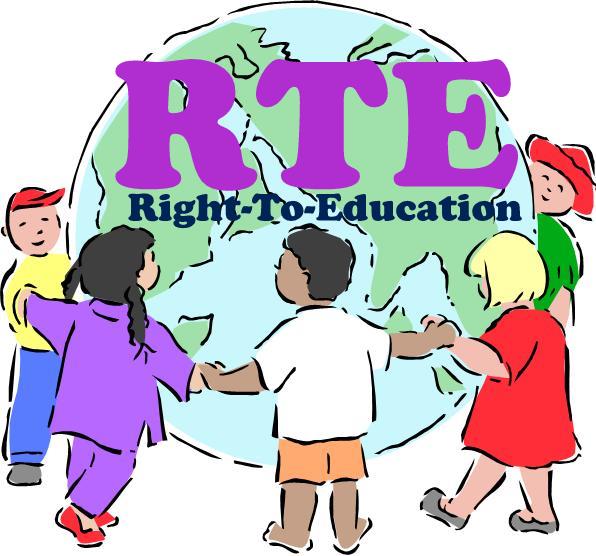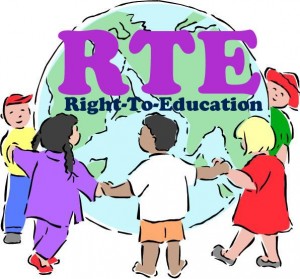“Har bachcha chamke ab school chale hum!”
Right to Education is a human right as declared by the United Nations. Sarva Shiksha Abhiyaan and its ‘constitutional sister’ RTE Act provides the same to children between 6-14 years of age. Before talking about the flip side of the Act, lets talk about the first side.
Right to Education (RTE) Act or precisely Right of children to free and compulsory education Act was passed by the Indian government in 2009 and enforced throughout India except Jammu and Kashmir in 2010. Moreover this right has been included in Article 21A under Fundamental Rights and Article 45 under Directive Principles of State Policy in the Indian Constitution, through the 86th Amendment. The Act has given hope and incentive to the poor people to send their children to schools, gain education and the resultant empowerment. This can prevent the child from taking up the same occupation practiced by his father and forefathers, rather dream something bigger and better than that. The Act is a step to reduce poverty, child labour and disguised unemployment. It even led to the proposition of opening more schools all over the country. The fact that private schools have to reserve 25% admission seats to the disadvantaged kids on a no-fee paying basis is also encouraging.
But what is the flip side of the coin? Lets explain it using an example. A 10 year old, class-4 boy studies in a government school and comes under the ambit of the RTE Act. A teacher comes to his class of 30 students, writes something on the blackboard regarding the lesson he/she intends to teach and ask the students to copy it in their notebooks. He/she then explains the lesson in a way that all the students who are learning it for the first time are perplexed and cannot understand what the teacher said. Our 10 year old boy gathers some courage, gets up and asks the teacher to explain it again. But the latter orders him to read it again or ask his classmates. The teacher then sits on the chair to while away the rest of the time remaining for the class to end.
This continues to happen with other subject teachers barring one or two. The days pass. By seeing the nature of the teachers, the boy too becomes indisciplined and gradually stops copying what is written on the board. Some days the teacher is not in mood to teach the students or the students are creating too much nuisance in the class. So he/she decides not to teach that day. When the year-end exams come, the boy somehow manages to rote-learn some part of the syllabus and appear for the test. When the results are out, to his disbelief, he sees that he has been passed and promoted to the next class through the concept of sarkaari pass. It is the passing mark much lower than the usual 33% who have not done well in the exams and come under the provisions of RTE Act. Year after year, the same thing happens with the boy.
Now the boy is 15 years old and studies in class-9. He has now become used to passing exams without doing much effort. Moreover the RTE Act does not apply to him anymore and has to pay a subsidised tuition fee to the school for continuing his education. Now the teacher who comes to teach him in the class assume that the students have learnt the previous concepts and explains the new concepts such a way that the boy fails to understand because he does not know much about the previous lessons.
So exactly what is happening here? By giving free and compulsory primary education to the boy, one is fulfilling their duty to provide him his right. But one did not ensure that he and his classmates get quality education. There was no substantial value added to the child’s academic knowledge. In the above example, the teacher knew that as per the Act students will pass whether he/she teaches or not. Since they are getting a fixed monthly salary and have job security as a government teacher, no matter what they do, there is no incentive to make an effort to teach the students.
The system of sarkaari pass or compulsorily passing the students is not right but cannot be done away with. Although its not mentioned in the Act, the government has to do it. The government, rather than the parents, are bearing the cost of the child’s education. Normally,when a child fail in the exams, he/she has study in the same class again. This means the government pays for that child’s education twice for the same class, increasing the expenditure. To prevent this from happening, it passes all the students who come under the RTE Act.
Who should be blamed for such consequences – the students, teachers, the Constitution or the government? I think the teachers are blameworthy in this case. RTE is a massive step towards progress. By giving a fundamental right, if one is not exercising their duty of providing quality education, then such right is worthless. The government has to be strict with the teachers. Teachers are responsible for the all round development of the child. They need to develop skills in teaching the poor students in such a way that the latter can understand and internalise. If the teachers become effective, I am sure that the flip side of RTE will become the same as the first side.





8 Comments. Leave new
Well explained about’ Right to Education’..
Thank you Chitranshi. Thanks for reading it.
Quite briefly analysed…u have a very cohesive style of writing…amazing work..
Thank you Akshita. Thanks for appreciating.
Good effort..!
Nice article.. Keep going..
Interesting point of view.
Well written!